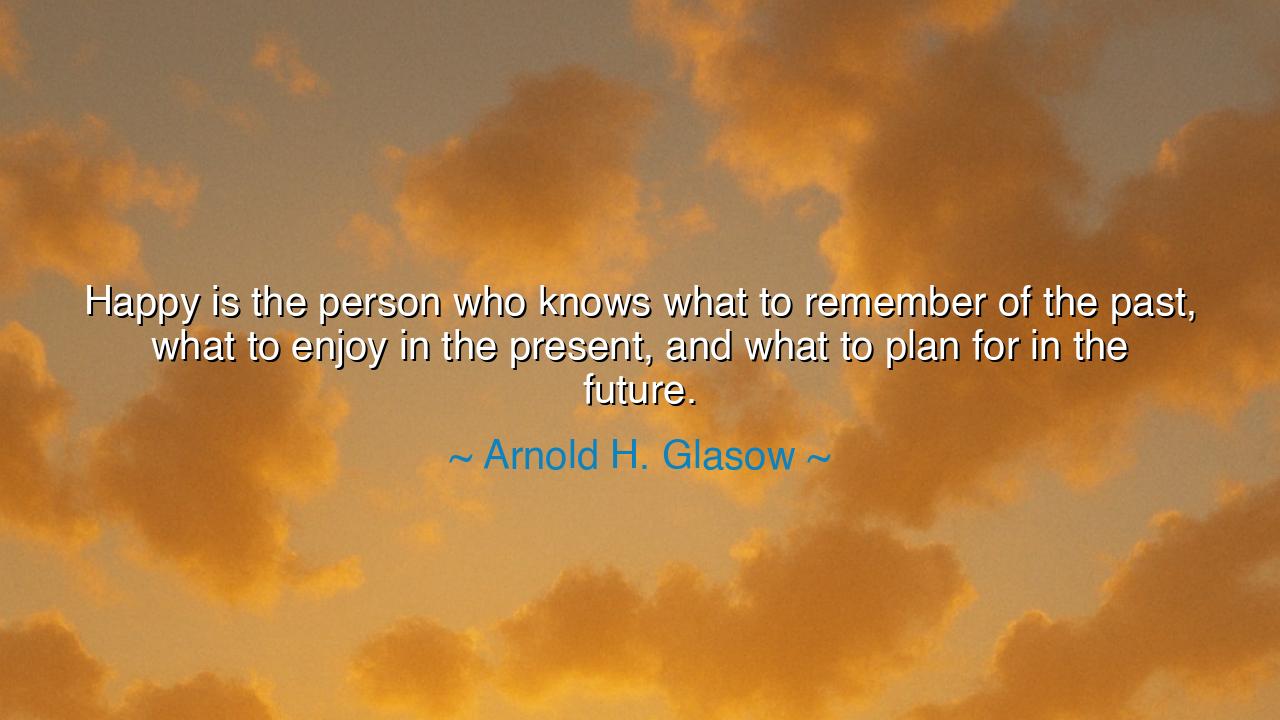
Happy is the person who knows what to remember of the past, what
Happy is the person who knows what to remember of the past, what to enjoy in the present, and what to plan for in the future.






"Happy is the person who knows what to remember of the past, what to enjoy in the present, and what to plan for in the future." These words from Arnold H. Glasow offer a profound insight into the nature of happiness. It is a happiness built not on fleeting moments or empty pursuits, but on a careful balance of memory, awareness, and foresight. To truly experience joy in life, one must understand the past, embrace the present, and shape the future. This balance is not easy to achieve, but it is the path to a life of fulfillment, wisdom, and peace.
In the ancient wisdom passed down through generations, the importance of remembering the past is frequently emphasized. The past is our teacher, our guide. It is the well from which we draw lessons, both bitter and sweet. Yet, remembering the past does not mean dwelling in it, for to do so would be to remain bound to what has already passed. The great philosopher Socrates once said, "The unexamined life is not worth living." In this, he speaks of the necessity to reflect on the past—not as a source of regret, but as a means of growth and understanding. Those who do not know their own history are destined to repeat their mistakes. The key to happiness, then, is in knowing what to remember—the lessons that will guide us forward, while leaving behind that which holds us back.
Consider King Solomon, the wise ruler of ancient Israel, who is said to have written the book of Proverbs. He teaches that wisdom begins with knowledge of the past. Solomon’s reign, though marked by prosperity and peace, was also shaped by the struggles and mistakes of those who came before him. He recognized that the wisdom of the past was essential for governing justly and wisely. In reflecting on the past, he was able to build a future for his people that was founded on lessons learned, rather than on the hubris of thinking that the past was irrelevant. True happiness, then, lies in understanding the power of the past to shape our future.
Equally important, Arnold H. Glasow reminds us of the need to enjoy the present. This is a truth echoed by Epicurus, the ancient Greek philosopher, who taught that true pleasure comes from living fully in the moment, not in constant pursuit of future gain. The present is all we truly possess, and to waste it on regrets for what is gone or anxieties about what lies ahead is to squander the gift of life. The joy of the present moment is found not in the grandeur of fleeting pleasures but in the quiet appreciation of what is here now—the people we love, the beauty around us, the quiet satisfaction of knowing that we are alive. Living with gratitude and awareness of the present moment is what fills the heart with true happiness.
The ancient warrior Alexander the Great, whose conquest stretched from Greece to India, understood the value of the present moment. Despite his ambition to carve an empire, he often paused to savor the experiences of the lands he conquered—the cultures, the victories, the lives of his soldiers. Though his future was uncertain and filled with the weight of leadership, he never allowed his desire for the future to rob him of the joy of the present. In his own way, Alexander embraced the fullness of life while on the move toward greater ambitions. This, too, is part of what Glasow’s quote suggests: to find joy in the journey, not just in the destination.
Finally, planning for the future is a necessary act of wisdom and foresight. The wise man does not live recklessly, hoping for fortune to find him. He prepares, he plans, and he takes action toward the life he desires. Consider the story of Thomas Edison, whose endless inventiveness and forward-thinking shaped the modern world. Edison understood that the future was not something that would happen to him, but something that he could mold with effort and vision. By understanding the potential of the present and planning for the future, he was able to change the world. Happiness, then, is not just in the enjoyment of the present but in the preparation for what lies ahead. It is a vision, a purpose, that shapes the soul.
Glasow’s words teach us the harmony of time—to live in the past, present, and future in a way that nourishes our soul. The past teaches, the present delights, and the future inspires. The balance of these three is the key to a fulfilling life, and it is through this balance that true happiness is achieved. To know what to remember, to live with awareness in the present, and to shape our future with vision and foresight is the path that leads us to a life of peace and joy.
Practical Actions:
-
Reflect on the past: Take time to learn from your experiences—what lessons can you draw from them to better your future?
-
Live fully in the present: Practice gratitude and mindfulness, appreciating what you have right now, without distraction or regret.
-
Plan for the future: Set clear goals and take actionable steps to create the life you want. Prepare today for the opportunities of tomorrow.
-
Balance your time: Don’t dwell excessively on the past or worry too much about the future. Instead, strike a harmonious balance that allows you to live fully in each moment.
-
Cultivate awareness: Practice being present in every moment—whether in conversation, work, or leisure—so that you can enjoy life as it happens.






AAdministratorAdministrator
Welcome, honored guests. Please leave a comment, we will respond soon